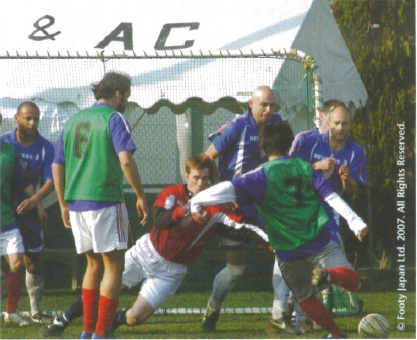by Jonathan Day
Thanks to the concerted efforts of two British football enthusiasts more than 100 years ago, football as a mainstream sport is now flourishing in Japan.
These days, football icons like former national captain Hidetoshi Nakata, Junichi Inamoto, and Shunsuke Nakamura have put Japanese football firmly on the international map. Nakata, for example, won an Italian championship medal with Roma and finished his career as a Bolton Wanderers player after the 2006 World Cup. Inamoto was playfully nicknamed ‘T-shirt’ during a spell spent largely on the bench at Arsenal, but went on to establish himself as a top-class midfielder with English Premier League rivals Fulham. Nakamura, whose free kicks are every bit as deadly as David Beckham’s, has been a revelation at Celtic and is being hotly pursued by several top European clubs.
There is no doubt that Japan co-hosting the 2002 FIFA World Cup with South Korea helped elevate what for decades hadn’t been a hugely popular sport in Japan. It was the first World Cup to be held in Asia and the first time in the competition’s history that two countries were selected by FIFA to stage the event. In the summer of 2002, an epidemic of “Football Fever” quickly broke out in Japan and spread like the plague.
For a long while, football lagged far behind baseball, but the 2002 World Cup inspired both fans and players alike. Although baseball will probably, at least for a while longer, be considered Japan’s favorite sport, football is now very, very hot on its heels. It won’t be long before we see the next generation of Nakata’s and Nakamura’s jetting off to Europe to show the world they too can compete at football’s highest and most reputable level. As for Japan’s national team however, that may take a while longer after such a disappointingly early exit at last year’s World Cup in Germany.
As much as organized football in Japan has a history longer than many give it credit for, the institutionalization of the modern game in Japan owes a debt of gratitude to a couple of British expats who “got the ball rolling,” to coin a phrase.
During the Meiji period, football was introduced (somewhat whimsically) along with a number of other sports in high schools and universities. However, at this time it was the passion and enthusiasm of British expats Mr. de Havilland, an English teacher in Tokyo, and Mr. Hart, a high school football coach in Nagoya, who, refusing to see their national sport marginalized in Japan, decided to promote the game nationwide.
The English Football Association, the 150-year-old governing body of the sport was another catalyst to the growth and popularity of the sport in Japan.
Upon hearing the news about the formation of the Japan Football Association, the FA sent Jigoro Kano, the chairperson of Japan’s Athletic Association (JFA), a letter of congratulations and presented him with a glorious silver cup. “I hope that this will lead to greater prosperity of Japanese sports and that diplomatic relations between our two countries will be closer,” said the British ambassador.
Following the official founding of the JFA in 1921, a number of notable British dignitaries have taken an active interest in supporting and promoting football in Japan, and the progress of the professional game has had a very positive knock-on effect on grassroots football in Japan—meaning that anybody (foreign or Japanese) who wants to play or learn about football can now do so.
For younger enthusiasts for example, one pioneering development has been the British Football Academy (www.footyjapan.com/bfat), a series of progressive football schools operating at a variety of locations in Tokyo and Yokohama that have been specifically instituted to deliver a British-style of football education to children, both foreign and Japanese, by English FA qualified coaches. The sessions, all coached in English, follow a simple maxim, “Football Fun For All!!” For kids, it doesn’t get much better than that!
For the adult football aficionados, there’s the ubiquitous, community-oriented Tokyo Metropolis League comprised of 24 teams (www.footyjapan.com/tml) that caters to internationally minded people who wish to play regular competitive 11-a-side football.
For those looking for a live football fix there are a number of ways to get hold of tickets: your local convenience store, ticket agents, the internet, and the stadiums themselves. Word to the wise however, unless you plan on watching the game through a pair of binoculars, you may opt to part with a few more yen when purchasing your ticket in order to secure a decent seat. Once inside the stadium you’ll be able to wash down some greasy yakisoba with a gargantuan sized beer, sit back, relax and, in time-honored tradition, hurl abuse at the referee (chances are he/she won’t understand you anyway).
For those who prefer the comfort of a raucous smoky bar, a pint of Guinness, and a flat-screen TV to enjoy their football, there are a host of bars around town that broadcast all the big football games from around the globe. The Footnik in Ebisu (www.footnik.net) for example, attracts enough football fans on any given weekend to put some J.League clubs to shame.
To find out more about amateur football for children or adults in Japan please visit www.footyjapan.com or email: [email protected].
Other football-friendly bars and pubs around Тоkуo:
The Town Cryer: www.towncryer.jp
Tokyo Sports Cafe: www.tokyo-sportscafe.com
The Hobgoblin: www.hobgoblin.jp
Legends Sports Bar: www.legendsports.jp
Paddy Foleys: www.paddyfoleystokyo.com
Mogambo: www.mogambo.net
Geronimo: www.geronimoshotbar.com









